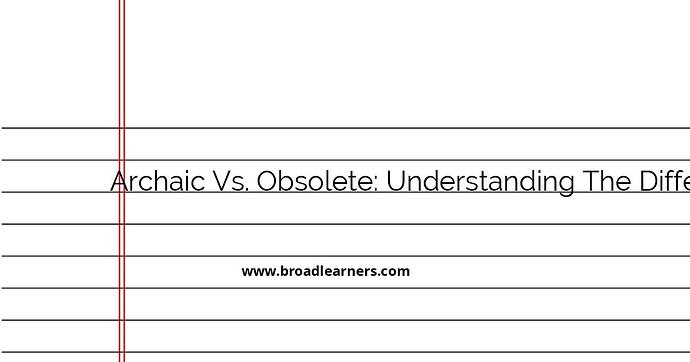The evolution of language is a continuous process, and as such, words often change in usage over time. Two terms that often arise in discussions about language history are archaic and obsolete. Both describe words that are no longer in common use, yet they have distinct meanings. This article will thoroughly explain the difference between these two terms and provide examples to help you understand their usage and significance.
- Archaic
-
Language elements classified as archaic are words or phrases that are no longer in everyday use but may still be understood and appreciated, primarily within context, by an educated speaker. They are often found in historical texts or literature and can add a sense of grandeur or historical depth when used purposefully.
Example:
The word 'thou' was commonly used in Middle English as the second person singular pronoun. "Thou art a brave knight," demonstrates its archaic use and can often be encountered in older literature, such as Shakespeare’s works.
- Obsolete
-
An obsolete word, on the other hand, is one that is no longer in use at all within the English language. It is not recognized or understood by the average speaker today without specific learning or reference to historical dictionaries. Such words have largely been replaced by more modern equivalents or have disappeared entirely.
Example:
The word 'forsooth', meaning "indeed" or "in truth," is considered obsolete today and has been replaced with more modern expressions like "indeed" or simply "yes." It is seldom used and would typically only be found in historical studies.
- Archaic in Context: Archaic terms can provide a stylistic effect when used in modern writing to evoke a certain time period or to add a formal tone, thus enriching the language with its historical texture.
- Obsolete Reference: Obsolete words are typically only accessed through the study of historical texts, philology, or the use of specialized dictionaries. These words no longer form part of active vocabulary and are rarely revived.
Understanding the distinction between archaic and obsolete words is crucial, especially for those studying historical texts or literary works. The usage of these terms impacts how we appreciate literary traditions and the development of the English language. Acknowledging their roles not only informs our reading of older literature but also enhances our comprehension of how language continually evolves.
Did I miss anything? Respond below
